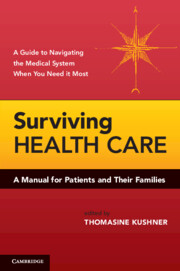Book contents
- Frontmatter
- Contents
- Contributors
- Preface
- 1 Letter to Patients
- 2 Becoming an Active Member of Your Health Care Team
- 3 Information That Will Help You with Advance Planning for Your Health Care
- 4 Responding to Medical Emergencies
- 5 What You Need to Know about Medical Errors
- 6 Being Informed When You Give Consent to Medical Care
- 7 Beware of Scorecards
- 8 Transplantation 101
- 9 When the Illness Is Psychiatric
- 10 On the Horizon
- 11 To Be or Not to Be – A Research Subject
- 12 Information That Will Help You Make Health Care Decisions for Adult Family Members
- 13 Caring for Individuals with Alzheimer's Disease
- 14 When the Patient Is a Child
- 15 Care of Elders
- 16 Being and Thinking
- 17 A Patient's Guide to Pain Management
- 18 The Hardest Decisions
- 19 What You Need to Know about Disasters
- 20 Making the Internet Work for You
- Appendix: Patient Individual Profile
- Index
- References
7 - Beware of Scorecards
Published online by Cambridge University Press: 05 June 2012
- Frontmatter
- Contents
- Contributors
- Preface
- 1 Letter to Patients
- 2 Becoming an Active Member of Your Health Care Team
- 3 Information That Will Help You with Advance Planning for Your Health Care
- 4 Responding to Medical Emergencies
- 5 What You Need to Know about Medical Errors
- 6 Being Informed When You Give Consent to Medical Care
- 7 Beware of Scorecards
- 8 Transplantation 101
- 9 When the Illness Is Psychiatric
- 10 On the Horizon
- 11 To Be or Not to Be – A Research Subject
- 12 Information That Will Help You Make Health Care Decisions for Adult Family Members
- 13 Caring for Individuals with Alzheimer's Disease
- 14 When the Patient Is a Child
- 15 Care of Elders
- 16 Being and Thinking
- 17 A Patient's Guide to Pain Management
- 18 The Hardest Decisions
- 19 What You Need to Know about Disasters
- 20 Making the Internet Work for You
- Appendix: Patient Individual Profile
- Index
- References
Summary
In this age of quick and easy mass communication, we have come to rely on published rankings to make our selections of things to purchase, places to vacation, and services to employ. The Internet makes advice especially accessible, and we have all become accustomed to searching out recommendations to guide our decisions about all sorts of choices, from the exhibits we should visit to the beaches that are best for snorkeling. Now, scorecards have even been introduced into the world of medicine.
Relying on public advice often is an improvement over mere guesswork and shooting in the dark. We now look to published performance data in the form of “report cards,” for example, on airline departure time records. Tourist guides have become a standard resource for travelers, with some authors developing a following because of their track record of reliably steering readers toward desirable restaurants, hotels, and resorts. Reports from the Consumers Union uphold high standards for testing products by objective and carefully constructed standards, so many of us consult their recommendations and rely on their assessments before we purchase a new car or vacuum cleaner.
Medicine certainly is an area in which expert advice is valuable. Decisions regarding what treatments to pursue and which to avoid, what sort of specialist is needed and when, which institutions to visit and which physician to consult all may be critical, and their consequences may be significant and enduring.
- Type
- Chapter
- Information
- Surviving Health CareA Manual for Patients and Their Families, pp. 85 - 95Publisher: Cambridge University PressPrint publication year: 2010

